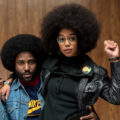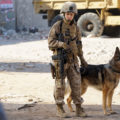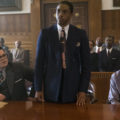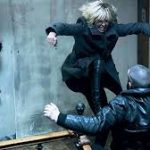
Director Kathryn Bigelow’s Hurt Locker and Zero Dark Thirty were intense and hard to sit through. Detroitmakes it even more difficult because it hits closer to home. It is a raw and soul-less depiction of racism during the Detroit riots of 1967. Some people called it a rebellion against an overwhelmingly White police force in a city that was more than 40 % African American.
Kathryn Bigelow says that the killing of a young Black man in Ferguson, Missouri nearly 50 years after the Detroit Riots prompted her to make this film. The director wanted to show that the issues that blew up the city are exactly the same today. Mark Boal, who worked with her on both her previous films, wrote the screenplay for this one. John Boyega (Star Wars: The Force Awakens), Anthony Mackie (The Hurt Locker), and Will Poulter (Revenant) star in this disturbing drama based on the real events.
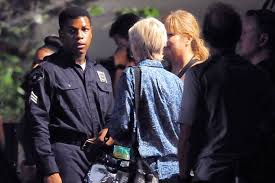
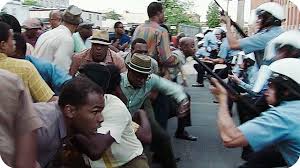
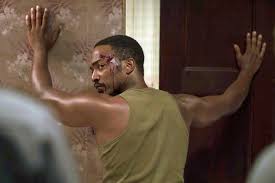
Bigelow employs dramatic documentary style to incorporate archival and news footage into the narrative. You see the raid on an after-hours club reenacted where police abused and arrested the Black patrons. The neighborhood exploded. More than 2000 buildings burned, 7200 people were arrested, nearly 1200 injured and 43 people died during the 12 days of rebellion in Detroit. State and local Police plus the National Guard were called in to try to quell violence and looting. Everyone was suspect.
Bigelow pieces together the true story of what happened at The Algiers Motel based on extensive research which included talking to the survivors of the incident. This film shows what happened with young people who gathered at the motel just to party. All it took was one kid fooling around with a toy gun to draw the attention of the police thinking there was a sniper. That turned out to be an excruciatingly brutal evening that terrorized 2 young White women and a group of young Black men. By the end of the night, 3 were dead.
Watching this movie, you will be traumatized by the racist treatment they received at the hands of the police led by Krauss (Poulter). Director Bigelow makes us watch the same torture these young people had to endure. We were shaking.
Cinematographer Barry Ackroyd, (Jason Bourne, Captain Phillips, The Hurt Locker) shoots as if the camera is a participant observing every action up close. It’s in your face and the faces the of the young victims. You see them sweat and bleed as they tremble in fear being tortured and helpless.
Will Poulter plays the trigger happy police officer controlling the questioning of these kids trying to find the “sniper” shooting at police from the motel. He gets fellow officers to be accomplices, screaming at and beating these kids making them believe they’re going to die. It is urban warfare that is horrifying. Poulter Is more than convincing as a cunning, scheming, poker-faced racist. He’s the epitome of injustice hiding behind the badge.
Boyega’s character is confusing. As Dismukes, he plays a hard-working security guard at a neighborhood store who is a witness to the brutality. But in the end, he goes along, to get along. Others in the neighborhood call him “Tom.” Bigelow’s portrayal of Dismukes is perhaps the most confounding. He wants to be a hero, but he can’t. He also pays a price. The real Dismukes was also a consultant on the film.
Bigelow’s pacing of the film is such that every time you think someone will come to rescue these powerless victims, it changes. It’s like a frightening roller coaster ride.
While Detroit is burning, it’s also serving as an incubator for the Motown Sound, the music that defined the times. Algee Smith plays Larry, the lead singer of The Dramatics who were just about to get their big break when the riots broke out. Watching Smith transform from a sweet-faced, starry eyed singer to a trembling bleeding victim up against the wall. They’re forced to pray to survive and he breaks into tearful song. That is a gut-wrenching moment.
Hannah Murray (Game of Thrones) plays Julie, one of the young White women terrorized during that night at the Algiers. This is a very different role for her. The real Julie who survived that night served as consultant to Bigelow and was on the set for every scene.
Violations of civil rights are still going on in cities all over the country. Bigelow made this powerful film because it is relatable today, 50 years later and we observed people leaving the theater shaking their heads.
Annapurna Pictures 2 hours 23 minutes R

